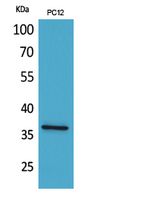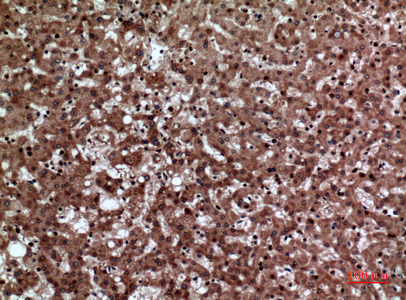JAM-A Polyclonal Antibody
- Catalog No.:YT5479
- Applications:WB;IHC;IF;ELISA
- Reactivity:Human;Rat
- Target:
- JAM-A
- Fields:
- >>Cell adhesion molecules;>>Tight junction;>>Leukocyte transendothelial migration;>>Epithelial cell signaling in Helicobacter pylori infection
- Gene Name:
- F11R
- Protein Name:
- Junctional adhesion molecule A
- Human Gene Id:
- 50848
- Human Swiss Prot No:
- Q9Y624
- Mouse Gene Id:
- 16456
- Mouse Swiss Prot No:
- O88792
- Rat Gene Id:
- 116479
- Rat Swiss Prot No:
- Q9JHY1
- Immunogen:
- The antiserum was produced against synthesized peptide derived from the Internal region of human F11R. AA range:191-240
- Specificity:
- JAM-A Polyclonal Antibody detects endogenous levels of JAM-A protein.
- Formulation:
- Liquid in PBS containing 50% glycerol, 0.5% BSA and 0.02% sodium azide.
- Source:
- Polyclonal, Rabbit,IgG
- Dilution:
- WB 1:500 - 1:2000. IHC: 1:100-1:300. ELISA: 1:20000.. IF 1:50-200
- Purification:
- The antibody was affinity-purified from rabbit antiserum by affinity-chromatography using epitope-specific immunogen.
- Concentration:
- 1 mg/ml
- Storage Stability:
- -15°C to -25°C/1 year(Do not lower than -25°C)
- Other Name:
- F11R;JAM1;JCAM;Junctional adhesion molecule A;JAM-A;Junctional adhesion molecule 1;JAM-1;Platelet F11 receptor;Platelet adhesion molecule 1;PAM-1;CD321
- Observed Band(KD):
- 32kD
- Background:
- Tight junctions represent one mode of cell-to-cell adhesion in epithelial or endothelial cell sheets, forming continuous seals around cells and serving as a physical barrier to prevent solutes and water from passing freely through the paracellular space. The protein encoded by this immunoglobulin superfamily gene member is an important regulator of tight junction assembly in epithelia. In addition, the encoded protein can act as (1) a receptor for reovirus, (2) a ligand for the integrin LFA1, involved in leukocyte transmigration, and (3) a platelet receptor. Multiple 5' alternatively spliced variants, encoding the same protein, have been identified but their biological validity has not been established. [provided by RefSeq, Jul 2008],
- Function:
- function:Seems to plays a role in epithelial tight junction formation. Appears early in primordial forms of cell junctions and recruits PARD3. The association of the PARD6-PARD3 complex may prevent the interaction of PARD3 with JAM1, thereby preventing tight junction assembly (By similarity). Plays a role in regulating monocyte transmigration involved in integrity of epithelial barrier. Involved in platelet activation. In case of orthoreovirus infection, serves as receptor for the virus.,PTM:N-glycosylated.,similarity:Belongs to the immunoglobulin superfamily.,similarity:Contains 2 Ig-like V-type (immunoglobulin-like) domains.,subcellular location:Localized at tight junctions of both epithelial and endothelial cells.,subunit:Interacts with the ninth PDZ domain of MPDZ. Interacts with the first PDZ domain of PARD3. The association between PARD3 and PARD6B probably disrupts this interactio
- Subcellular Location:
- Cell junction, tight junction . Cell membrane ; Single-pass type I membrane protein . Localized at tight junctions of both epithelial and endothelial cells. .
- Expression:
- Expressed in endothelium, epithelium and leukocytes (at protein level).
- June 19-2018
- WESTERN IMMUNOBLOTTING PROTOCOL
- June 19-2018
- IMMUNOHISTOCHEMISTRY-PARAFFIN PROTOCOL
- June 19-2018
- IMMUNOFLUORESCENCE PROTOCOL
- September 08-2020
- FLOW-CYTOMEYRT-PROTOCOL
- May 20-2022
- Cell-Based ELISA│解您多样本WB检测之困扰
- July 13-2018
- CELL-BASED-ELISA-PROTOCOL-FOR-ACETYL-PROTEIN
- July 13-2018
- CELL-BASED-ELISA-PROTOCOL-FOR-PHOSPHO-PROTEIN
- July 13-2018
- Antibody-FAQs
- Products Images

- Western Blot analysis of PC12 cells using JAM-A Polyclonal Antibody. Secondary antibody(catalog#:RS0002) was diluted at 1:20000
.jpg)
- Immunohistochemical analysis of paraffin-embedded human-liver, antibody was diluted at 1:100

- Immunohistochemical analysis of paraffin-embedded human-liver, antibody was diluted at 1:100



